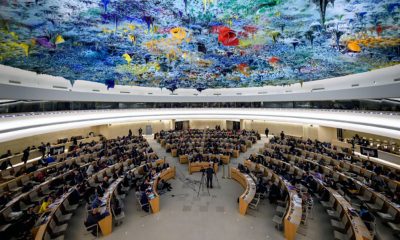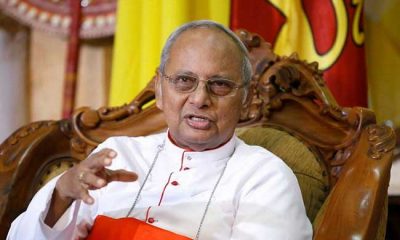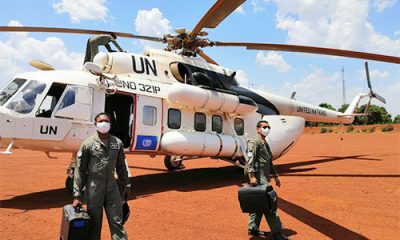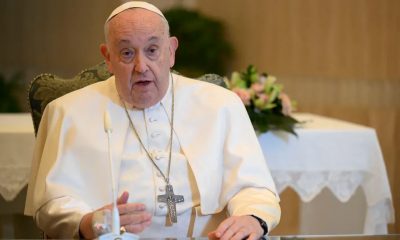Midweek Review
15th anniversary reflections: Sri Lanka’s diplomatic victory, Geneva, May 2009
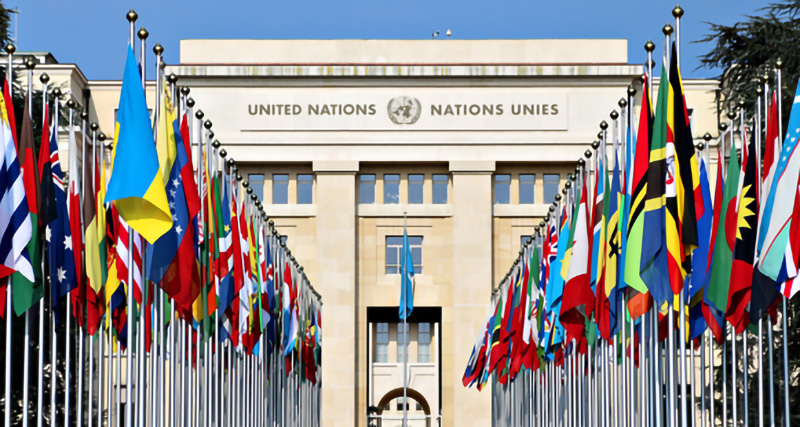
By SANJA DE SILVA JAYATILLEKA
With Israel having been issued with a judicial order of the International Court of Justice (ICJ) on its operations in Rafah in Occupied Palestine following South Africa’s two interventions in the Hague to prevent what is seen as genocide in Palestine, Sri Lanka’s own experience in Geneva as its long war was coming to an end 15 years ago in 2009 comes to mind– especially the 11th Special Session at which Sri Lanka defeated allegations of war crimes against it through a vote on its own ‘pre-emptive counter-resolution’ at the UN Human Rights Council (UNHRC).
What has Israel got to do with Sri Lanka’s experience in Geneva at the end of the war? For one, Israel attempted to bring a resolution about Sri Lanka’s conduct of the war at the World Health Assembly (WHA) headquarters in Geneva in 2009 during the sessions at which then Health Minister Nimal Siripala de Silva was to assume the rotational Presidency of the Assembly. This was days before the 11th Special Session of the UNHRC on Sri Lanka and had it succeeded, it would have impacted negatively on Sri Lanka’s case. As it happened, that attempt failed as it didn’t gather adequate support at the Assembly to be brought before it. Minister Nimal Siripala de Silva was hailed as a returning hero at the Katunayake Airport.
After Sri Lanka won the vote at the UNHRC, Foreign Secretary Palitha Kohona phoned the Sri Lankan delegation still milling around in the hall, with a single question: “What did Israel say?” The answer was that its delegate spoke against Sri Lanka’s winning resolution, although not having a vote at the Council, Israel could not vote against it.
The most interesting aspect of the International Community’s responses to Israel’s war on Gaza is how it brings into relief a well-worn and effective foreign policy tool which has been successfully used for decades: deliberate and consciously deployed double-standards.
War Crimes
In 2009 in Geneva, the attempt by a coalition of Western nations was to bring charges of war crimes against Sri Lanka. They started the preparations well before the final operations had commenced. There was a draft resolution circulating at the UNHRC ready to be tabled on those lines in 2006. Yes, as the last war was beginning and three years before the final offensive.
The UN and its member states had been reeling from the failure to prevent the genocide in Rwanda in 1994. In 2005 the UN endorsed the doctrine of the Responsibility to Protect (R2P). This concept was used regularly and liberally in Geneva in the discourse of some Western states and the concerned non-governmental organizations with regard to Sri Lanka.
The United States ‘Ambassador for War Crimes’ Clint Williamson was overseeing the Sri Lanka file. Yes, there was one then. Is there one now, and if so, what does he/she say about Gaza? Wikileaks revealed Williamson as having lamented in discussions in June 2009 in Paris with his French counterpart Christiane Bernier, the failure of the Western attempt against Sri Lanka at the UNHRC in May.
If the West had obtained a UN mandate through a vote in Geneva, the pressure on Colombo to stop the war would have been tremendous, with non-compliance opening the road to the Hague.
Ukraine and Sri Lanka
Now consider the on-going wars in 2024. There is one fought between the Russian Federation and the Ukraine over ethnic Russian border regions and hugely complicated by larger geopolitical implications including understandings arrived at the highest levels between Western Powers and Russia regarding the West’s expansion of NATO after the USSR pulled its troops out of Eastern Germany facilitating the reunified Germany’s membership of NATO. Complex issues abound in this conflict.
There’s a visibly more tragic one being fought in Gaza, between a nuclear-armed Occupying state and a non-state formation engaging in asymmetric war, also engaging in terrorism as part of its arsenal. The visuals every night on TV is a reminder of bombed out cities in dystopian movies or black-and-white footage of the end of the 2nd World War.
The non-state actor regards their existential circumstances as legitimizing the resort to terrorist tactics. Terrorism by definition is carried out against uninvolved, unarmed civilians. The justification of terrorism is not an argument which finds sympathy in the majority of the UN member states even while a majority absolutely comprehends the horrendous conditions of the daily lives of Palestinians and are in support of their calls for an immediate ceasefire and independent statehood for Palestine.
Two weeks after a case was presented to the ICC regarding the Russia-Ukraine War, an order was issued for ceasefire and arrest of President Putin among others. As a result, President Putin could not attend the important BRICS summit held in South Africa (a signatory to the Rome Statute) last year, and addressed it virtually.
In support of the Ukrainian side, the EU and the US allocate tens of billions of dollars’ worth of weapons for use in the on-going war, in which they explicitly regard defeat of the Russian Federation and the victory of Ukraine as imperative.
Israel’s war on Gaza where on-going genocide is alleged, has resulted in indictments by the International Criminal Court (ICC) against Prime Minister Benjamin Netanyahu and some of his Cabinet colleagues as well as Hamas leaders. And yet, it is unlikely that Netanyahu will feel the need to attend virtually, the meeting scheduled for him in the United States.
While being accused of serious war crimes and cries against humanity, and through South Africa’s case at the ICJ, of genocide, in an on-going war, those accused are also granted their requests to the US and the West for billions in weapons for use in that very war.
I recall that the West refused to sell Sri Lanka weapons and, in some cases, to train our military in their institutions when Sri Lanka was similarly accused by its opponents. Even our closest neighbour was unable to be seen to accommodate requests by Foreign Minister Lakshman Kadirgamar for material help during the LTTE’s offensive on Jaffna in year 2000. Most of the equipment and training came most readily from Pakistan and China, outside of the western sphere of influence.
Calling out Hypocrisy
This hypocrisy extended to the diplomatic arena, where it thrives. While not called by its name, it is a well-honed mechanism which is camouflaged with much self-righteousness. It is also by calling out these double-standards that “Geneva-style diplomacy” (as Sri Lanka’s 2007-2009 diplomacy in Geneva was called by some of Colombo’s former senior career diplomats) won the day, much to the surprise of many including at the Foreign Ministry in Colombo.
Reflecting on Sri Lanka’s diplomatic victory 15 years ago in Geneva, one can now see at least one reason why that victory turned out to be unique, never to be repeated. Perhaps it is an overhang of years of colonialism, but it was generally considered best not to challenge other nations on their declared sincerity and principled stances on human rights, especially the West, even when their charges were directed against us and were misplaced. Even if one objected behind closed doors, hypocrisy was never to be called out openly, while Sri Lanka was constantly vilified as guilty of “system-wide” war crimes and crimes against humanity.
The argument went that “our markets” are in the West, and if we upset them, we could lose our biggest trading partners, never mind the wild allegations with their dire consequences for small nations like ours. The Sri Lankan foreign policy establishment’s stand was that the West was the repository of “civilized democratic values” and we are “civilized people” who are natural friends and allies with the West as opposed to those countries who support Sri Lanka staunchly and call out the hypocrisy of the West, including in our defence.
This servile cast of mind caused one Sri Lankan administration led by its PM and Foreign Minister to co-sponsor a resolution brought by the West, which envisaged hybrid courts containing foreign judges. Some are still proud of having done so and echo that rhetoric.
The 2009 UNHRC victory that prevented the wartime Sri Lankan political and military leaders of being indicted of war crimes was achieved because the Ambassador/Permanent Representative and the SL team in Geneva had the confidence to persuade the vast majority of members of the UNHRC, reminding them of our common experience at the hands of those who accused us, and the insincerity of those allegations. Thereby Sri Lanka managed to prevail in the arena where the West had held sway for decades.
That this achievement is hardly celebrated in this country except briefly in its immediate aftermath, does not reduce its relevance to those who are interested in international relations. It is by changing the game that one can prevail against a party that invented it; not by playing by its rules, but by improving them to be more equitable and consistent. That is why the Sri Lankan team in Geneva in 2009 have been called “norm entrepreneurs” in international scholarly literature on the subject of that victory.
It is also useful to note that the Foreign Ministry in Colombo never debriefed the Ambassador who led the effort in order to learn the lessons. However, the techniques and processes have been turned into a module in a diplomatic training institute in one respected country of the Global South and a leading European institution invited the then Ambassador to give a lecture on how the May 2009 victory was achieved, to post-graduate students in International Relations. Several studies have resulted in book chapters, books and even a PhD thesis by non-Sri Lankans.
Non-Aligned, Neutral, Multi-Aligned
The 2009 victory in Geneva was achieved also because of clarity. As Ambassador Dayan Jayatilleka (my spouse) who led the effort in Geneva used to say, we must know what we are, who we are and where we are. In 2009, we were clear that we had been a founder member of the largest coalition of states at the UN, the NAM, and respected members of it. We were located in the global South, and shared a narrative of the geopolitical history of the Third World.
Those who bury the NAM as irrelevant, even dead, must question why it hasn’t been disbanded. Even as the NAM enthusiastically agreed to present Sri Lanka’s resolution to the UNHRC in May 2009, giving it much more heft than if it were presented by a small island at the tip of India, our own Foreign Minister at the time was telling the Ambassador in Geneva to forget the NAM, it was broken in several places. The Western Ambassadors by contrast, ruefully said that they never thought that Sri Lanka’s Ambassador would be able to deploy the NAM so effectively. When it comes to a battle by big powers against a small state, the Global South is a game changer.
The term “neutral” relates to a time of war. It is not a grouping, it is a position taken, which is not guaranteed to be sustainable. How could it be a long-term foreign policy stance when one doesn’t know what it is neutral about and between which countries? Yet Sri Lanka proposed it a few years back as its official Foreign Policy, before deciding it wasn’t helping and therefore called it “neutral and nonaligned”.
The latest trend is “multi-aligned”. This is currently India’s stance. Some are keen to adopt it in Sri Lanka. They too say that “non-aligned” is old-fashioned, the trending ideas are different and we should claim to be multi-aligned.
This is yet another instance of forgetting what we are and where we are. India can say whatever they like because they are members of the Quad as well as of BRICS. Their size and position in the world including its economy ensure they are welcomed with as much warmth in Moscow as in Washington. They are successfully multi-aligned. Yet, they remain members of the coalition of states called the Non-aligned Movement.
The ‘M’ in NAM stands for Movement. It isn’t a position taken. It was a historical necessity in the evolution of the world order and has served its members well. It remains as a forum where agreement can be reached as a group, giving them the strength of numbers, with the necessary consensus often producing moderate positions in international relations. Whatever else we call ourselves, for a small island state at any time, but especially when we are in such trouble as now, it is best to understand what these terms mean before abandoning them through ignorance or servility.
Sri Lanka’s team in Geneva in 2009 used its non-aligned stance and status to present its case effectively and win the day. It had the knowledge, the savvy, the courage and the capacity to scan the world community, its balance of power, the foreign policy concepts in play including R2P, and understand their uneven applications. It called out the over-confident but unprepared hegemonic powers dazzled by their own propaganda. It played for Sri Lanka and its people, to assert its sovereign right to re-unify its territory. And by doing so, it was victorious.
The government of the day took this victory for granted. Though the victory in war unified the country and brough much needed peace, it failed to complete the unification of the people and adhere to its promises. The Ambassador who won the battle in Geneva for them wrote a book called Long War, Cold Peace. He had been recalled within six weeks of that unique victory by the President who sent him there.
The reason was never given, but was variously speculated as due to two reasons: his urging in the print media to keep the promises made at the UN and to India by the head of state, and secondly, as acceding to a request by Israel to remove him due to his intervention on the 2008 Gaza war at the UNHRC, urging Israel to desist from using white phosphorous and other methods that led to thousands of civilian deaths. This intervention too was with the express agreement of the President, who also headed the Palestine Solidarity Committee in Sri Lanka at the time.
Geneva 2009 remains an unsurpassed achievement at the UN for Sri Lanka. It also offers some lessons such as the need for clarity and courage in the practice of diplomacy, the global responsibility of all states to intervene to shape the discourse of international relations, and the benefits of coalition building with like-minded states, always guided by what’s best for this island of ours and its people.
[Sanja de Silva Jayatilleka is author of the book ‘Mission Impossible Geneva: Sri Lanka’s Counter-Hegemonic Asymmetric Diplomacy at the UN Human Rights Council’, Vijitha Yapa, Colombo, 2017.]
Midweek Review
Fonseka clears Rajapaksas of committing war crimes he himself once accused them of
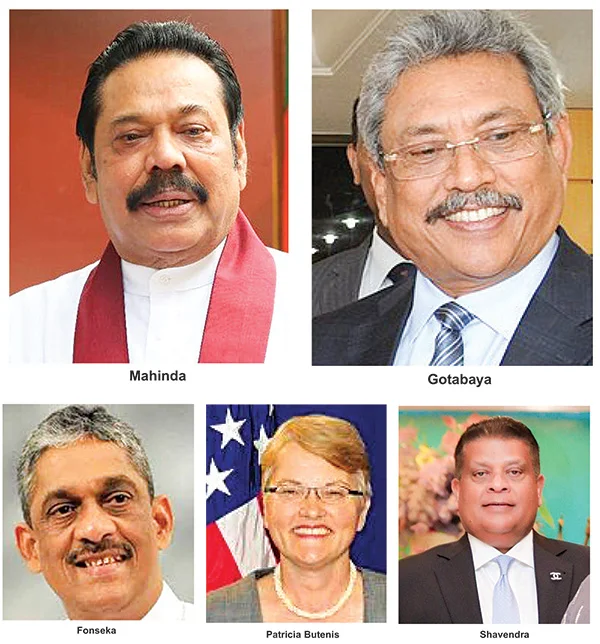
With Sri Lanka’s 17th annual war victory over separatist Tamil terrorism just months away, warwinning Army Chief, Field Marshal Sarath Fonseka (Dec. 06, 2005, to July 15, 2009) has significantly changed his war narrative pertaining to the final phase of the offensive that was brought to an end on May 18, 2009.
The armed forces declared the conclusion of ground operations on that day after the entire northern region was brought back under their control. LTTE leader Velupillai Prabhakaran, hiding within the secured area, was killed on the following day. His body was recovered from the banks of the Nanthikadal lagoon.
With the war a foregone conclusion, with nothing to save the increasingly hedged in Tigers taking refuge among hapless Tamil civilians, Fonseka left for Beijing on May 11, and returned to Colombo, around midnight, on May 17, 2009. The LTTE, in its last desperate bid to facilitate Prabhakatan’s escape, breached one flank of the 53 Division, around 2.30 am, on May 18. But they failed to bring the assault to a successful conclusion and by noon the following day those fanatical followers of Tiger Supremo, who had been trapped within the territory, under military control, died in confrontations.
During Fonseka’s absence, the celebrated 58 Division (formerly Task Force 1), commanded by the then Maj. Gen. Shavendra Silva, advanced 31/2 to 4 kms and was appropriately positioned with Maj. Gen. Kamal Gunaratne’s 53 Division. The LTTE never had an opportunity to save its leader by breaching several lines held by frontline troops on the Vanni east front. There couldn’t have been any other option than surrendering to the Army.
The Sinha Regiment veteran, who had repeatedly accused the Rajapaksas of war crimes, and betraying the war effort by providing USD 2 mn, ahead of the 2005 presidential election, to the LTTE, in return for ordering the polls boycott that enabled Mahinda Rajapaksa’s victory, last week made noteworthy changes to his much disputed narrative.
GR’s call to Shavendra What did the former Army Commander say?
* The Rajapaksas wanted to sabotage the war effort, beginning January 2008.
* In January 2008, Mahinda Rajapaksa, Defence Secretary Gotabaya Rajapaksa and Navy Commander VA Wasantha Karannagoda, proposed to the National Security Council that the Army should advance from Vavuniya to Mullithivu, on a straight line, to rapidly bring the war to a successful conclusion. They asserted that Fonseka’s strategy (fighting the enemy on multiple fronts) caused a lot of casualties.
* They tried to discourage the then Lt. Gen. Fonseka
* Fonseka produced purported video evidence to prove decisive intervention made by Defence Secretary Gotabaya Rajapaksa on the afternoon of May 17. The ex-Army Chief’s assertion was based on a telephone call received by Maj. Gen. Shavendra Silva from Gotabaya Rajapaksa. That conversation had been captured on video by Swarnavahini’s Shanaka de Silva who now resides in the US. He had been one of the few persons, from the media, authorised by the Army Headquarters and the Defence Ministry to be with the Army leadership on the battlefield. Fonseka claimed that the videographer fled the country to escape death in the hands of the Rajapaksas. It was somewhat reminiscent of Maithripala Sirisena’s claim that if Rajapaksas win the 2015 Presidential election against him he would be killed by them.
* Shanaka captured Shavendra Silva disclosing three conditions laid down by the LTTE to surrender namely (a) Their casualties should be evacuated to Colombo by road (b) They were ready to exchange six captured Army personnel with those in military custody and (c) and the rest were ready to surrender.
* Then Fonseka received a call from Gotabaya Rajapaksa, on a CDMA phone. The Defence Secretary issued specific instructions to the effect that if the LTTE was to surrender that should be to the military and definitely not to the ICRC or any other third party. Gotabaya Rajapaksa, one-time Commanding Officer of the 1st battalion of the Gajaba Regiment, ordered that irrespective of any new developments and talks with the international community, offensive action shouldn’t be halted. That declaration directly contradicted Fonseka’s claim that the Rajapaksas conspired to throw a lifeline to the LTTE.
Fonseka declared that the Rajapaksa brothers, in consultation with the ICRC, and Amnesty International, offered an opportunity for the LTTE leadership to surrender, whereas his order was to annihilate the LTTE. The overall plan was to eliminate all, Fonseka declared, alleging that the Rajapaksa initiated talks with the LTTE and other parties to save those who had been trapped by ground forces in a 400 m x 400 m area by the night of May 16, among a Tamil civilian human shield held by force.
If the LTTE had agreed to surrender to the Army, Mahinda Rajapaksa would have saved their lives. If that happened Velupillai Prabhakaran would have ended up as the Chief Minister of the Northern Province, he said. Fonseka shocked everyone when he declared that he never accused the 58 Division of executing prisoners of war (white flag killings) but the issue was created by those media people embedded with the military leadership. Fonseka declared that accusations regarding white flag killings never happened. That story, according to Fonseka, had been developed on the basis of the Rajapaksas’ failed bid to save the lives of the LTTE leaders.
Before we discuss the issues at hand, and various assertions, claims and allegations made by Fonseka, it would be pertinent to remind readers of wartime US Defence Advisor in Colombo Lt. Col. Lawrence Smith’s June 2011 denial of white flag killings. The US State Department promptly declared that the officer hadn’t spoken at the inaugural Colombo seminar on behalf of the US. Smith’s declaration, made two years after the end of the war, and within months after the release of the Darusman report, dealt a massive blow to false war crimes allegations.
UN Secretary-General Ban Ki-moon, in 2010, appointed a three-member Panel of Experts, more like a kangaroo court, consisting of Marzuki Darusman, Yasmin Sooka, and Steven Ratner, to investigate war crimes accusations.
Now Fonseka has confirmed what Smith revealed at the defence seminar in response to a query posed by Maj. General (retd.) Ashok Metha of the IPKF to Shavendra Silva, who had been No 02 in our UN mission, in New York, at that time.
White flag allegations
‘White flag’ allegations cannot be discussed in isolation. Fonseka made that claim as the common presidential candidate backed by the UNP-JVP-TNA combine. The shocking declaration was made in an interview with The Sunday Leader Editor Frederica Jansz published on Dec. 13, 2009 under ‘Gota ordered them to be shot – General Sarath Fonseka.’
The ‘white flag’ story had been sensationally figured in a leaked confidential US Embassy cable, during Patricia Butenis tenure as the US Ambassador here. Butenis had authored that cable at 1.50 pm on Dec. 13, 2009, the day after the now defunct The Sunday Leader exclusive. Butenis had lunch with Fonseka in the company of the then UNP Deputy Leader Karu Jayasuriya, according to the cable. But for the writer the most interesting part had been Butenis declaration that Fonseka’s advisors, namely the late Mangala Samaraweera, Anura Kumara Dissanayake (incumbent President) and Vijitha Herath (current Foreign Minister) wanted him to retract part of the story attributed to him.
Frederica Jansz fiercely stood by her explosive story. She reiterated the accuracy of the story, published on Dec. 13, 2009, during the ‘white flag’ hearing when the writer spoke to her. There is absolutely no reason to suspect Frederica Jansz misinterpreted Fonseka’s response to her queries.
Subsequently, Fonseka repeated the ‘white flag’ allegation at a public rally held in support of his candidature. Many an eyebrow was raised at The Sunday Leader’s almost blind support for Fonseka, against the backdrop of persistent allegations directed at the Army over Lasantha Wickrematunga’s killing. Wickrematunga, an Attorney-at-Law by profession and one-time Private Secretary to Opposition Leader Sirimavo Bandaranaike, was killed on the Attidiya Road, Ratmalana in early January 2009.
The Darusman report, too, dealt withthe ‘white flag’ killings and were central to unsubstantiated Western accusations directed at the Sri Lankan military. Regardless of the political environment in which the ‘white flag’ accusations were made, the issue received global attention for obvious reasons. The accuser had been the war-winning Army Commander who defeated the LTTE at its own game. But, Fonseka insisted, during his meeting with Butenis, as well as the recent public statement that the Rajapaksas had worked behind his back with some members of the international community.
Fresh inquiry needed
Fonseka’s latest declaration that the Rajapaksas wanted to save the LTTE leadership came close on the heels of Deputy British Prime Minister David Lammy’s whistle-stop visit here. The UK, as the leader of the Core Group on Sri Lanka at the Geneva-based United Nations Human Rights Council, spearheads the campaign targeting Sri Lanka.
Lammy was on his way to New Delhi for the AI Impact Summit. The Labour campaigner pushed for action against Sri Lanka during the last UK general election. In fact, taking punitive action against the Sri Lankan military had been a key campaign slogan meant to attract Tamil voters of Sri Lankan origin. His campaign contributed to the declaration of sanctions in March 2025 against Admiral of the Fleet Wasantha Karannagoda, General (retd) Shavendra Silva, General (retd) Jagath Jayasuriya and ex-LTTE commander Karuna, who rebelled against Prabhakaran. Defending Shavendra Silva, Fonseka, about a week after the imposition of the UK sanctions, declared that the British action was unfair.
But Fonseka’s declaration last week had cleared the Rajapaksas of war crimes. Instead, they had been portrayed as traitors. That declaration may undermine the continuous post-war propaganda campaign meant to demonise the Rajapaksas and top ground commanders.
Canada, then a part of the Western clique that blindly towed the US line, declared Sri Lanka perpetrated genocide and also sanctioned ex-Presidents Mahinda Rajapaksa and Gotabaya Rajapaksa. Other countries resorted to action, though such measures weren’t formally announced. General (retd) Jagath Dias and Maj. Gen (retd) Chagie Gallage were two of those targeted.
Against the backdrop of Fonseka’s latest claims, in respect of accountability issues, the urgent need to review action taken against Sri Lanka cannot be delayed. Although the US denied visa when Fonseka was to accompany President Maithripala Sirisena to the UN, in Sept. 2016, he hadn’t been formally accused of war crimes by the western powers, obviously because he served their interests.
On the basis of unsubstantiated allegations that hadn’t been subjected to judicial proceedings, Geneva initiated actions. The US, Canada and UK acted on those accusations. The US sanctioned General Shavendra Silva in Feb. 2020 and Admiral Karannagoda in April 2023.
What compelled Fonseka to change his narrative, 18 years after his Army ended the war? Did Fonseka base his latest version solely on Shanaka de Silva video? Fonseka is on record as claiming that he got that video, via a third party, thereby Shanaka de Silva had nothing to do with his actions.
DNA and formation of DP
Having realised that he couldn’t, under any circumstances, reach a consensus with the UNP to pursue a political career with that party, Fonseka teamed up with the JVP, one of the parties in the coalition that backed his presidential bid in 2010. Fonseka’s current efforts to reach an understanding with the JVP/NPP (President Anura Kumara Dissanayake is the leader of both registered political parties) should be examined against the backdrop of their 2010 alliance.
Under Fonseka’s leadership, the JVP, and a couple of other parties/groups, contested, under the symbol of the Democratic National Alliance (DNA) that had been formed on 22 Nov. 2009. but the grouping pathetically failed to live up to their own expectations. The results of the parliamentary polls, conducted in April 2010, had been devastating and utterly demoralising. Fonseka, who polled about 40% of the national vote at the January 2010 presidential election, ended up with just over 5% of the vote, and the DNA only managed to secure seven seats, including two on the National List. The DNA group consisted of Fonseka, ex-national cricket captain Arjuna Ranatunga, businessman Tiran Alles and four JVPers. Anura Kumara Dissanayake was among the four.
Having been arrested on February 8, 2010, soon after the presidential election, Fonseka was in prison. He was court-martialed for committing “military offences”. He was convicted of corrupt military supply deals and sentenced to three years in prison. Fonseka vacated his seat on 7 Oct .2010. Following a failed legal battle to protect his MP status, Fonseka was replaced by DNA member Jayantha Ketagoda on 8 March 2011. But President Mahinda Rajapaksa released Fonseka in May 2012 following heavy US pressure. The US went to the extent of issuing a warning to the then SLFP General Secretary Maithripala Sirisena that unless President Rajapaksa freed Fonseka he would have to face the consequences (The then Health Minister Sirisena disclosed the US intervention when the writer met him at the Jealth Ministry, as advised by President Rajapaksa)
By then, Fonseka and the JVP had drifted apart and both parties were irrelevant. Somawansa Amarasinghe had been the leader at the time the party decided to join the UNP-led alliance that included the TNA, and the SLMC. The controversial 2010 project had the backing of the US as disclosed by leaked secret diplomatic cables during Patricia Butenis tenure as the US Ambassador here.
In spite of arranging the JVP-led coalition to bring an end to the Rajapaksa rule, Butenis, in a cable dated 15 January 2010, explained the crisis situation here. Butenis said: “There are no examples we know of a regime undertaking wholesale investigations of its own troops or senior officials for war crimes while that regime or government remained in power. In Sri Lanka this is further complicated by the fact that responsibility for many of the alleged crimes rests with the country’s senior civilian and military leadership, including President Rajapaksa and his brothers and opposition candidate General Fonseka.”
Then Fonseka scored a major victory when Election Commissioner Mahinda Deshapriya on 1 April, 2013, recognised his Democratic Party (DNA was registered as DP) with ‘burning flame’ as its symbol. There hadn’t been a previous instance of any service commander registering a political party. While Fonseka received the leadership, ex-Army officer Senaka de Silva, husband of Diana Gamage ((later SJB MP who lost her National List seat over citizenship issue) functioned as the Deputy Leader.
Having covered Fonseka’s political journey, beginning with the day he handed over command to Lt. Gen. Jagath Jayasuriya, in July, 2009, at the old Army Headquarters that was later demolished to pave the way for the Shangri-La hotel complex, the writer covered the hastily arranged media briefing at the Solis reception hall, Pitakotte, on 2 April, 2023. Claiming that his DP was the only alternative to what he called corrupt Mahinda Rajapaksa’s government and bankrupt Ranil Wickremesinghe-led Opposition, a jubilant Fonseka declared himself as the only alternative (‘I am the only alternative,’ with strapline ‘SF alleges Opposition is as bad as govt’. The Island, April 3, 2013).
Fonseka had been overconfident to such an extent, he appealed to members of the government parliamentary group, as well as the Opposition (UNP), to switch allegiance to him. As usual Fonseka was cocky and never realised that 40% of the national vote he received, at the presidential election, belonged to the UNP, TNA and the JVP. Fonseka also disregarded the fact that he no longer had the JVP’s support. He was on his own. The DP never bothered to examine the devastating impact his 2010 relationship with the TNA had on the party. The 2015 general election results devastated Fonseka and underscored that there was absolutely no opportunity for a new party. The result also proved that his role in Sri Lanka’s triumph over the LTTE hadn’t been a decisive factor.
RW comes to SF’s rescue
Fonseka’s DP suffered a humiliating defeat at the August 2015 parliamentary polls. The outcome had been so bad that the DP was left without at least a National List slot. Fonseka was back to square one. If not for UNP leader and Prime Minister Ranil Wickremesinghe, Fonseka could have been left in the cold. Wickremesinghe accommodated Fonseka on their National List, in place of SLFPer M.K.D.S. Gunawardene, who played a critical role in an influential section of the party and the electorate shifting support to Maithripala Sirisena. Gunawardena passed away on 19 January, 2016. Wickremesinghe and Fonseka signed an agreement at Temple Trees on 3 February, 2016. Fonseka received appointment as National List MP on 9 February, 2016, and served as Minister of Regional Development and, thereafter, as Minister of Wildlife and Sustainable Development, till Oct. 2018. Fonseka lost his Ministry when President Sirisena treacherously sacked Wickremesinghe’s government to pave the way for a new partnership with the Rajapaksas. The Supreme Court discarded that arrangement and brought back the Yahapalana administration but Sirisena, who appointed Fonseka to the lifetime rank of Field Marshal, in recognition of his contribution to the defeat of terrorism, refused to accommodate him in Wickremesinghe’s Cabinet. The President also left out Wasantha Karannagoda and Roshan Goonetilleke. Sirisena appointed them Admiral of the Fleet and Marshal of Air Force, respectively, on 19, Sept. 2019, in the wake of him failing to secure the required backing to contest the Nov. 2019 presidential election.
Wickremesinghe’s UNP repeatedly appealed on behalf of Fonseka in vain to Sirisena. At the 2020 general election, Fonseka switched his allegiance to Sajith Premadasa and contested under the SJB’s ‘telephone’ symbol and was elected from the Gampaha district. Later, following a damaging row with Sajith Premadasa, he quit the SJB as its Chairman and, at the last presidential election, joined the fray as an independent candidate. Having secured just 22,407 votes, Fonseka was placed in distant 9th position. Obviously, Fonseka never received any benefits from support extended to the 2022 Aragalaya and his defeat at the last presidential election seems to have placed him in an extremely difficult position, politically.
Let’s end this piece by reminding that Fonseka gave up the party leadership in early 2024 ahead of the presidential election. Senaka de Silva succeeded Fonseka as DP leader, whereas Dr. Asosha Fernando received appointment as its Chairman. The DP has aligned itself with the NPP. The rest is history.
By Shamindra Ferdinando
Midweek Review
Strengths and weaknesses of BRICS+: Implications for Global South

The 16th BRICS Summit, from 22 to 24 October 2024 in Kazan, was attended by 24 heads of state, including the five countries that officially became part of the group on 1 January: Saudi Arabia, the United Arab Emirates, Iran, Egypt and Ethiopia. Argentina finally withdrew from the forum after Javier Milei’s government took office in 2023.
In the end, it changed its strategy and instead of granting full membership made them associated countries adding a large group of 13 countries: two from Latin America (Bolivia and Cuba), three from Africa (Algeria, Nigeria, Uganda) and eight from Asia (Belarus, Indonesia, Kazakhstan, Malaysia, Thailand, Turkey, Uzbekistan and Vietnam). This confirms the expansionary intent of the BRICS, initiated last year and driven above all by China, which seeks to turn the group into a relevant multilateral forum, with focus on political than economic interaction, designed to serve its interests in the geopolitical dispute with the United States. This dispute however is not the making of China but has arisen mainly due to the callous bungling of Donald Trump in his second term in office.
China has emerged as the power that could influence the membership within the larger group more than its rival in the region, India. Obviously, the latter is concerned about these developments but seems powerless to stop the trend as more countries realize the need for the development of capacity to resist Western dominance. India in this regard seems to be reluctant possibly due to its defence obligations to the US with Trump declaring war against countries that try to forge partnerships aiming to de-dollarize the global economic system.
The real weakness in BRICS therefore, is the seemingly intractable rivalry between China and India and the impact of this relationship on the other members who are keen to see the organisation grow its capacity to meet its stated goals. China is committed to developing an alternative to the Western dominated world order, particularly the weaponization of the dollar by the US. India does not want to be seen as anti-west and as a result India is often viewed as a reluctant or cautious member of BRICS. This problem seems to be perpetuated due to the ongoing border tensions with China. India therefore has a desire to maintain a level playing field within the group, rather than allowing it to be dominated by Beijing.
Though India seems to be committed to a multipolar world, it prefers focusing on economic cooperation over geopolitical alignment. India thinks the expansion of BRICS initiated by China may dilute its influence within the bloc to the advantage of China. India fears the bloc is shifting toward an anti-Western tilt driven by China and Russia, complicating its own strong ties with the West. India is wary of the new members who are also beneficiaries of China’s Belt and Road Initiative. While China aims to use BRICS for anti-Western geopolitical agendas, India favors focusing on South-South financial cooperation and reforming international institutions. Yet India seems to be not in favour of creating a new currency to replace the dollar which could obviously strengthen the South-South financial transactions bypassing the dollar.
Moreover, India has explicitly opposed the expansion of the bloc to include certain nations, such as Pakistan, indicating a desire to control the group’s agenda, especially during its presidency.
In this equation an important factor is the role that Russia could play. The opinion expressed by the Russian foreign minister in this regard may be significant. Referring to the new admissions the Russian Foreign Minister Sergey Lavrov has said: “The weight, prominence and importance of the candidates and their international standing were the primary factors for us [BRICS members]. It is our shared view that we must recruit like-minded countries into our ranks that believe in a multipolar world order and the need for more democracy and justice in international relations. We need those who champion a bigger role for the Global South in global governance. The six countries whose accession was announced today fully meet these criteria.”
The admission of three major oil producing countries, Saudi Arabia, Iran and UAE is bound to have a significant impact on the future global economic system and consequently may have positive implications for the Global South. These countries would have the ability to decisively help in creating a new international trading system to replace the 5 centuries old system that the West created to transfer wealth from the South to the North. This is so because the petro-dollar is the pillar of the western banking system and is at the very core of the de-dollarizing process that the BRICS is aiming at. This cannot be done without taking on board Saudi Arabia, a staunch ally of the west. BRICS’ expansion, therefore, is its transformation into the most representative community in the world, whose members interact with each other bypassing Western pressure. Saudi Arabia and Iran are actively mending fences, driven by a 2023 China-brokered deal to restore diplomatic ties, reopen embassies, and de-escalate regional tensions. While this detente has brought high-level meetings and a decrease in direct hostility rapprochement is not complete yet and there is hope which also has implications, positive for the South and may not be so for the North.
Though the US may not like what is going on, Europe, which may not endorse all that the former does if one is to go by the speech delivered by the Canadian PM in Brazil recently, may not be displeased about the rapid growth of BRICS. The Guardian UK highlighted expert opinion that BRICS expansion is rather “a symbol of broad support from the global South for the recalibration of the world order.” A top official at the Konrad Adenauer Foundation, Caroline Kanter has told the daily, “It is obvious that we [Western countries] are no longer able to set our own conditions and standards. Proposals will be expected from us so that in the future we will be perceived as an attractive partner.” At the same time, the bottom line is that BRICS expansion is perceived in the West as a political victory for Russia and China which augurs well for the future of BRICS and the Global South.
Poor countries, relentlessly battered by the neo-liberal global economy, will greatly benefit if BRICS succeeds in forging a new world order and usher in an era of self-sufficiency and economic independence. There is no hope for them in the present system designed to exploit their natural resources and keep them in a perpetual state of dependency and increasing poverty. BRICS is bound to be further strengthened if more countries from the South join it. Poor countries must come together and with the help of BRICS work towards this goal.
by N. A. de S. Amaratunga
Midweek Review
Eventide Comes to Campus
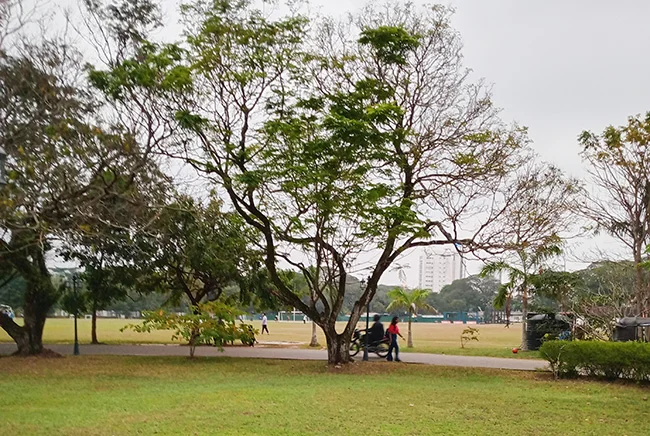
In the gentle red and gold of the setting sun,
The respected campus in Colombo’s heart,
Is a picture of joyful rest and relief,
Of games taking over from grueling studies,
Of undergrads heading home in joyful ease,
But in those bags they finally unpack at night,
Are big books waiting to be patiently read,
Notes needing completing and re-writing,
And dreamily worked out success plans,
Long awaiting a gutsy first push to take off.
By Lynn Ockersz
-

 Features4 days ago
Features4 days agoWhy does the state threaten Its people with yet another anti-terror law?
-

 Features4 days ago
Features4 days agoReconciliation, Mood of the Nation and the NPP Government
-

 Features4 days ago
Features4 days agoVictor Melder turns 90: Railwayman and bibliophile extraordinary
-

 Features3 days ago
Features3 days agoLOVEABLE BUT LETHAL: When four-legged stars remind us of a silent killer
-

 Features4 days ago
Features4 days agoVictor, the Friend of the Foreign Press
-

 Latest News5 days ago
Latest News5 days agoNew Zealand meet familiar opponents Pakistan at spin-friendly Premadasa
-

 Latest News5 days ago
Latest News5 days agoTariffs ruling is major blow to Trump’s second-term agenda
-

 Latest News5 days ago
Latest News5 days agoECB push back at Pakistan ‘shadow-ban’ reports ahead of Hundred auction


